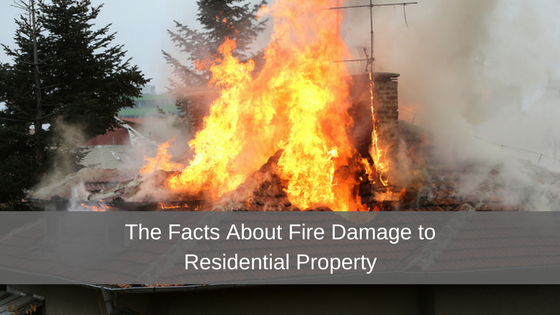This isn’t a do-it-yourself cleaning job. It takes Fire Watch professionals experienced in restoration fire damage with the equipment and know-how it requires to safely restore your property to its original condition.
What Fire Leaves Behind
Apart from any structural damage and personal property it has destroyed when it’s active, what fire leaves behind can also be destructive.
Ash and smoke can cause corrosion, etching of glass, and discoloration of walls and surfaces and the items on them. Clothing, linens, mattresses, carpets, and upholstery can discolor and be suffused with lasting odors. Some of the aftermath depends on the cause of the fire:
- Protein fires caused by food that has burned on the stove or in the oven leave a strong odor and smoke residue on surfaces and contents.
- Complex fires that burn multiple natural and synthetic items cause noxious odors and black smoke residue on contents and surfaces that need to be mitigated for corrosion control.
- Natural fires that burn trees and other outdoor landscaping cause smoke and ash to filter into the structure through openings around doors, windows, and attic vents leaving residue and strong odors.
- Malfunctioning heating appliances such as oil-fired furnaces cause smoke to be distributed throughout the property.
Fire can also cause electrical hazards by burning wires and connections. And ducts and insulation may be effected within the walls and attic or crawl spaces.
Why Rapid Clean-Up is so Important
The first thing that ash does is discolor most surfaces, and because it is acidic, the longer it remains, the more damage it will do. Plastic will discolor within minutes. Within hours fiberglass and the finishes on appliances will start to yellow, and metals will begin to tarnish. After just a few days, ash will cause permanent discoloration of walls and everything made of fabric.
After a few weeks, metal will start corroding, windows and other items made of glass will become permanently etched, and wood and vinyl surfaces may deteriorate to the point where they need to be replaced. Over time, ash builds up in layers and may eventually form a lacquer-like finish that’s impossible to remove.
Why Call in Professionals
Smoke and fire damage needs to be cleaned with extreme thoroughness as well as care. Ash residue can be spread with the least disturbance and contaminate the whole property. Experts will identify what can and cannot be salvaged, and they have the products and equipment required for the comprehensive treatment of surfaces and neutralization of odors. The Institute of Inspection Cleaning and Restoration Certification (IICRC) is the primary oversight agency in the industry, with registrants certified to have extensive training in mitigation of fire damage.
Professional restoration companies will also coordinate directly with your insurance adjuster to make the process as easy as possible for you, and will generally be able to bill your insurer directly.
How Your Tenants Will be Affected
Assuming your tenants do not have to vacate because of damage to the structure, whether they remain in residence during smoke and ash mitigation is ultimately up to you and them. Things to consider are general safety concerns, odors, noise from equipment, and convenience.
You also need to have a good understanding of your state’s laws about a landlord’s requirement to uphold an implied warranty of habitability to your tenants.
Items such as clothing and linens may have to be sent to offsite facilities for cleaning, and items of significant value, such as artwork and heirlooms will need to be sent for specialized care by a qualified restorer.
Depending upon the source, nature, and extent of the fire, it may be recommended to remove all contents to a secure facility for cleaning and storage so that your property can be thoroughly restored. This is an especially expedient approach if the restoration will require additional work by contractors who will be performing work such as drywall and painting, electrical, plumbing, flooring or carpeting, replacement of windows, or other extensive repairs.
If your tenants do vacate during the restoration process, they should take with them all valuables, important documents, and irreplaceable personal possessions.
A landlord insurance policy will help mitigate the repair cost from fire damage, while your tenants’ renter insurance policy will cover damaged personal property.
Renters, investors, landlords, and property managers in affected areas are advised to seek licensed legal assistance in their area for more advice on their state’s rental laws regarding fire damage to rental properties.
